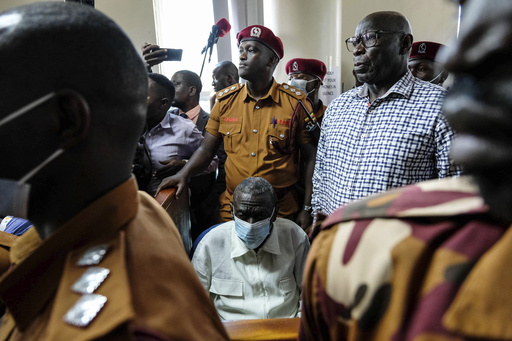
KAMPALA, Uganda — On Wednesday, Kizza Besigye, a key figure in the Ugandan opposition, made a brief appearance in a civilian court, but his attorney’s efforts to secure his release faced setbacks as the judge noted his poor health condition, preventing him from adequately following the court proceedings.
Following this brief court appearance, Besigye, who has been in detention since November, was returned to a maximum-security facility in Kampala, the nation’s capital.
The ongoing detention of Besigye is becoming a focal point for his supporters and human rights advocates, who are increasingly voicing concerns about his health and the need for medical attention outside of prison. They warn that any negative outcomes related to his wellbeing while incarcerated could lead to significant unrest in Uganda.
In response to his continuing detention, Besigye’s family has reported that he has begun a hunger strike as a form of protest. This comes after the Supreme Court of Uganda ruled last month that civilians cannot be tried by military courts, which raises questions about Besigye’s current legal status. His attorneys argue that he, along with others previously charged in military tribunals, should have been released immediately. However, justice officials are currently reviewing evidence to potentially bring him to trial in a civilian court.
Besigye, who has run for president four times, is recognized as a significant opposition figure in Uganda. Historically, he has been the primary challenger to President Yoweri Museveni, who has maintained a grip on power since 1986. Besigye’s prominence has recently faced competition from another opposition leader, Bobi Wine.
Besigye’s detention began when he was reported missing in Nairobi, Kenya, on November 16. Shortly thereafter, he appeared in a cage before a military tribunal in Uganda, where he faced charges related to national security threats. Subsequent allegations included treachery, a charge under military law that comes with the possibility of the death penalty.
The Commonwealth nations, of which Uganda is a member, have urged the Ugandan government to release Besigye and his co-accused assistant, Obeid Lutale, asserting that their detention is improper. The Commonwealth expressed concerns regarding Uganda’s adherence to the rule of law and its commitment to the principles outlined in the Commonwealth Charter.
Amnesty International has similarly called for his release, arguing that his abduction contravened international human rights laws and required fair trial protections. Despite this, President Museveni indicated that a trial is necessary for Besigye to answer the serious allegations against him.
Military prosecutors claim that Besigye engaged in discussions in Europe aimed at acquiring weapons, allegedly to destabilize national security. While these charges remain unproven, Museveni’s son, army commander Muhoozi Kainerugaba, accused Besigye of plotting to assassinate the president, claiming that such actions warranted severe punishment.
Besigye’s spouse, Winnie Byanyima, the Executive Director of UNAIDS, has spoken out, labelling the charges against her husband as a frame job, while his legal counsel describes them as driven by political motivations.
The situation surrounding Besigye is being closely monitored by Ugandans, particularly as the country approaches presidential elections next year. Museveni is expected to run for re-election, although there is speculation that he might step back for Kainerugaba in what could be a peaceful political shift.
This potential transition is shrouded in uncertainty since Museveni lacks a clear successor in the ruling National Resistance Movement party. Besigye, who is a qualified physician with a background in the military, previously served as a military assistant and personal doctor to Museveni. Now, he stands as a vocal critic of the longstanding president.
Uganda has yet to experience a smooth transition of presidential authority since gaining independence from colonial rule over sixty years ago, leaving many citizens anxious about the country’s uncertain political future.

